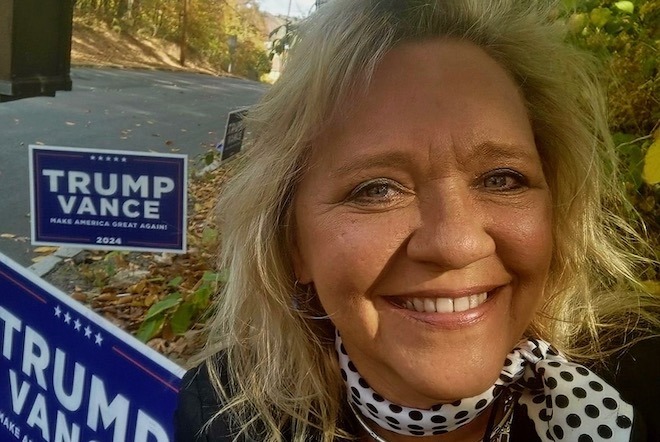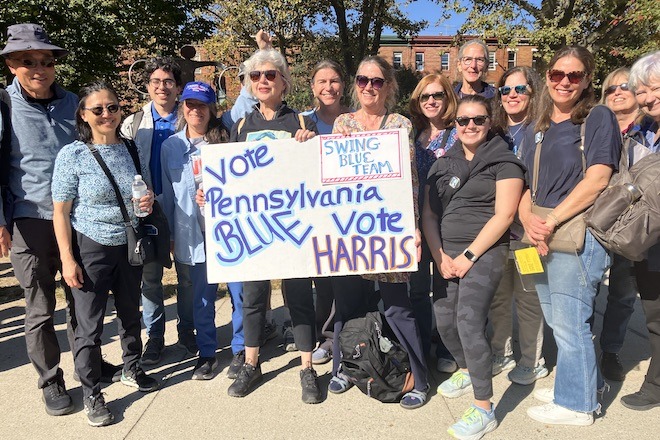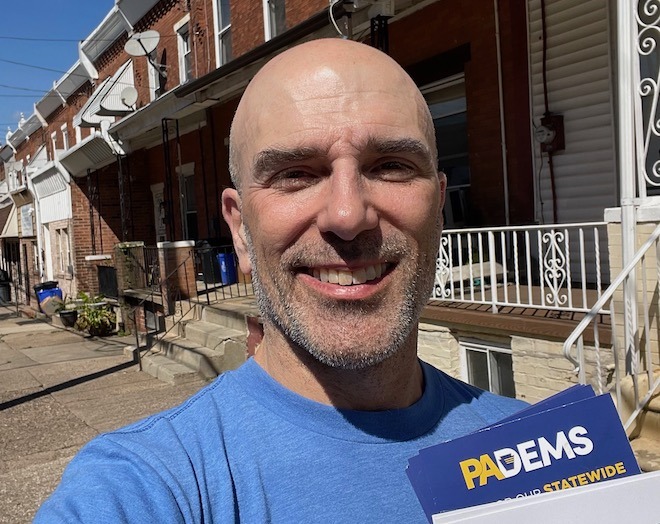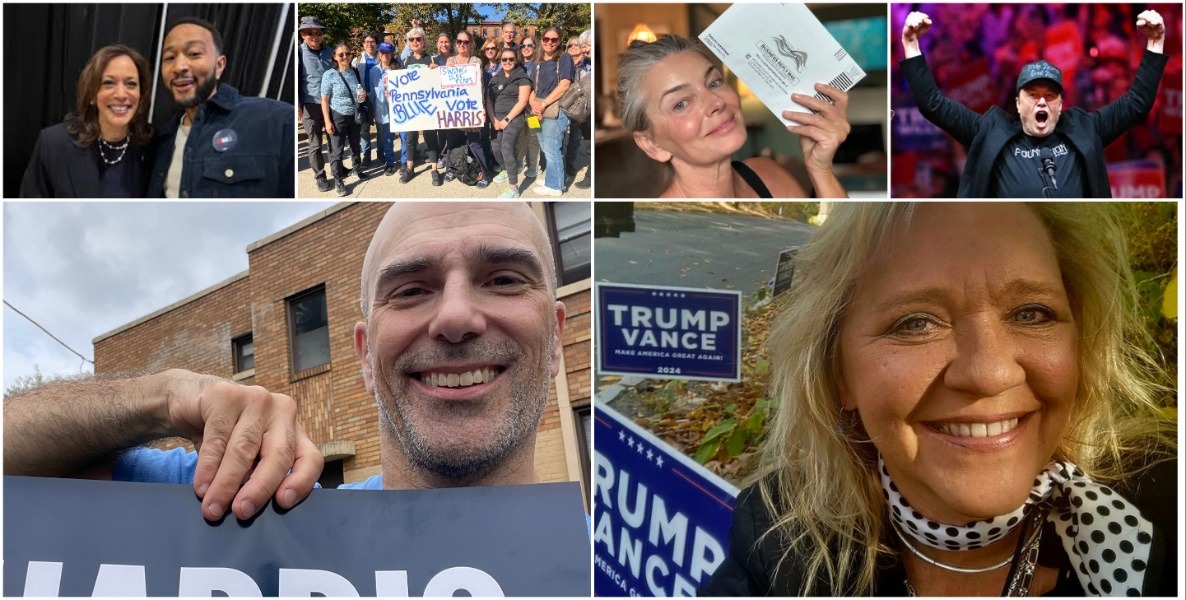Bruce Springsteen. Elon Musk. John Legend. Actors Tessa Thompson, Mark Ruffalo and Christina Baranski, 80s supermodel Paulina Porizkova, and Dasha Navalnaya, daughter of the late Russian opposition activist Alexander Navalny — they’re just some of the boldfaced names who have been or will be descending upon Philly to campaign for their preferred candidates in the lead-up to the November 5, 2024 election.
But celebs aren’t the only ones migrating here: Regular folks from across the country and around the world have been converging upon our city to do their part.
Take Gabe Furey, a lifelong Londoner. The 26-year-old arrived in Philly last week, driven by a mix of intrigue, passion, and panic, to be an unpaid volunteer for the Harris-Walz campaign. “I am absolutely fascinated by American politics. I find it mesmerizing and a little bit bonkers,” he says. “I’m also incredibly appreciative of how important the upcoming presidential election is for American society and from a geopolitical context.”
Back in the UK, Furey started canvassing for the Labor Party at age 12. “It’s one thing to be interested and looking from a distance and hoping for the outcome you want – or you can go and try to make a difference,” he says. “The beauty of a democracy is that you’re able to change the way a society looks, and that happens during election cycles, that happens with a new government.”
“This year, it just seems like we’re at a fork in the road where one way goes off a cliff and the other goes to a bridge. Selfishly, I don’t want to go off the cliff. — Khris Lewin
Furey said that, even in the UK, it’s no secret that “Pennsylvania is the state that will most likely decide the election.” In 2016, you’ll remember, the election was won in PA by a meager 44,000-plus votes — the slimmest margin in any presidential election since the 1800s. If you believe polling, this year’s race continues to be neck and neck in the Commonwealth. It’s understandable, then, that candidates are pulling out all the stops — Beyoncé, Leonardo DiCaprio and Michelle Obama to the left, Dr. Phil and Mel Gibson to the right — and that supporters are recruiting far and wide.
Furey, for his part, took a leave from his job at a climate tech startup, reached out to nearly 100 contacts at Harris-Walz organizations, and ultimately connected with the South Philly Voter Project (SPVP), the voter outreach initiative co-sponsored by State Representative Elizabeth Fiedler and State Senator Nikil Saval. According to its website, in 2022 SPVP “mobilized over 200 neighbors to knock on 33,000 doors and delivered overall turnout that was 10 percent higher than the city’s average.” Furey will be here for three more weeks as an unpaid volunteer; SPVP arranged free housing for him in the neighborhood.
Both sides, from everywhere
Trump supporters are also crossing the Atlantic to support their candidate. Steffi Behrends, a self-described pro-life mother to four adult children and the wife of a late Marine Corps Officer, has been living in Germany working for the Alternative für Deutschland, Germany’s far-right conservative party, for nearly four years.
But this American election, she felt, was too important to watch from a distance. “I couldn’t be on that side of the Atlantic when the biggest election in the history of the last 40 years is going on,” she says. Behrends left her job, sublet her apartment in Fulda, Germany, then got to work contacting every GOP ward leader in Philadelphia, searching for a place to stay so that she could live off the $40 per hour stipend she would be paid to canvass for the Trump-Vance campaign.
Constance Winters of the 59th Ward in Germantown took her in, giving her a place to stay — and use of her car. Now, Behrends spends her days knocking on doors in Montgomery County, registering folks to vote, signing them up for mail-in ballots, and talking to them about the issues.

“You can always just ask the two questions on your questionnaire, but I talk to them more than that,” she says. “I added my own questions to the conversations, like If you could tell President Trump anything personally, what would you say? They love that.”
Some people, she says, thank her for her work. “One woman I really connected with was a single mom raising two kids and running a small business out of her house. She had no time to register or go out and vote, so we went through the process together,” Behrends says. Other people have been less enthusiastic. “I’ve heard everything from F you to get off my property to having the door slammed in my face.”
“The beauty of a democracy is that you’re able to change the way a society looks, and that happens during election cycles, that happens with a new government.” — Gabe Furey
Not everyone has crossed an ocean to be here, but some have crossed the country. Dick Watkins was born and raised in Los Angeles, educated in Oregon, and now lives in a log cabin in Chehalis, Washington. “Looking out my window, my closest neighbor isn’t for at least a half-mile,” he says. It’s a far cry from the landscape in South Philadelphia, where Watkins spent three days making calls to registered Republicans, asking them to volunteer at the polls on November 5.
Now in his 70s, Watkins has voted in every election since he was 18, but he didn’t become politically active until Trump lost the election in 2020. “Washington is a blue state, so I can’t affect Trump’s election there,” he says. “But when I found out that Pennsylvania is a 50/50 swing state, I wanted to campaign for Trump there.”
He has a son who lives in South Philly and provided him with a free place to stay while working under the direction of South Philly GOP ward leader Matthew Wolfe. “I spent four hours a day for three days cold-calling, and I think I got four or five people to commit to being at the polls all day on November 5,” he says.
Some people hung up on him as soon as he said he was a Republican. Others sent him right to voicemail. “But most people were nice,” he says. “It was grueling work, but I want to do anything I can to help Trump. I’ve owned an electrical business for 40 years, and [have the mindset that] you gotta produce. You go out and you work and you get things done. So in politics, I’m just trying to get things done.”
A long history of political volunteering
Robin Kolodny, professor of Political Science at Temple University and co-author of The Fundamentals of Campaign Finance in the U.S., says that the history of political volunteering in our country began out of individuals’ need for work.
“When we think about what people call political machines, that was the idea that people who weren’t terribly wealthy would be indebted to a political organization or establishment for their livelihood. So you would go ahead and work for the organization, and that’s how you became, say, a postal worker or got one of these other patronage positions,” Kolodny explains. In time, Kolodny says, a lot of mass mobilization came to be affiliated with labor unions. “That was a robust source of volunteer labor for a very long time.”
“Importing” volunteers from other states and overseas may seem like a new phenomenon — and, certainly, the rise in social media has made it easier for organizers to recruit volunteers and volunteers to share their experiences — but it has existed for decades, Kolodny explains.
You have people who live in states where a race is not very competitive, but a nearby area might be highly competitive — and “if people are willing to do it, you can bring them to a place where volunteering, especially going door to door, is going to be really helpful.” Historically that often looked like union workers from New York or Maryland — places that are decidedly not swing states — getting on buses and coming into Philly for the day.

Social science has taught us that credible messengers — folks who have similar lived experiences to an audience they’re trying to get through to — can be key to changing behavior; that means neighbors talking to neighbors. That many 2024 volunteers are from out of state is likely less relevant to local voters during a national election than it would be during, say, a Council race, or a referendum on a hyperlocal issue.
Patricia Baker of Gloucester, MA, took an unpaid leave of absence from her legal services job in Boston to oversee unpaid volunteers for Swing Blue Alliance, an organization that registers voters, provides them with education, and encourages them to vote for progressive and Democratic candidates. Once in Philly, she worked outside the U.S. Citizen and Immigration Services (USCIS) office to register people who had just gone through naturalization. She helped arrange registration on college campuses and in high-traffic areas, registering anyone, regardless of party affiliation. The group has since moved on to door knocking; Baker is currently overseeing a team in South Philly.
“I want to do anything I can to help Trump. I’ve owned an electrical business for 40 years, and [have the mindset that] you gotta produce. You go out and you work and you get things done. So in politics, I’m just trying to get things done.” — Dick Watkins
“People are very high-energy this year. They’re here because they’re deeply committed to what’s happening in the country, they want to be as involved as they can in reaching out to voters and helping people really appreciate what’s at stake,” she says. “Despair, anxiety — those are luxuries we can’t afford. People need to really be out here doing stuff. Phone calling, reaching out to relatives in swing states. We shouldn’t be putting our heads in the sand or biting our fingernails.”

Closer to home, Khris Lewin has driven up to six hours roundtrip every Saturday for the last two months, to and from his home in Brooklyn, NY, to knock on doors in West Philadelphia for the Harris-Walz campaign. “There’s the [saying] ‘Every election is the most important election,’ and it always feels that way. But this year, it just seems like we’re at a fork in the road where one way goes off a cliff and the other goes to a bridge. Selfishly, I don’t want to go off the cliff.”
He finds it therapeutic to get involved and put his anxious energy towards something. “Sure, it’s beyond inconvenient to spend six hours a day in a car to do this,” he says. “But I’m doing it because I really want to.”
Whatever side of the aisle they’re on, the longer you talk to campaign workers — paid and unpaid both — the more alike they start to sound. Though they may define it differently, they talk about wanting to save democracy. They talk about the refreshing beauty of connecting with people face-to-face in an era when we’re increasingly only connecting online. They talk about wanting to feel like they didn’t let history pass them by, that they contributed, that they did something.
Kolodny says that’s valid insight and there may be some truth to overlapping temperament, similar levels of fervor. “But it’s not a false equivalence,” she cautions. There are certain hot-button issues about which folks may never see eye to eye.
While across-the-aisle bonding may not be in the cards, Kolodny acknowledges that one ancillary benefit of campaign volunteerism are the bonds that often form among team members. It’s not uncommon that like-minded volunteers may form strong connections. “Hopefully that’s a good social capital building [opportunity],” Kolodny says. Whether those bonds last is debatable, but it has that potential, akin to something like the quick, intense relationships formed at sleep-away camp.
Furey, the Londoner, certainly sees that social potential. Deciding where he’ll go to watch the results come in on November 5, he considers New York, where he has friends. “But by then, I’ll probably have made enough friends in Philadelphia to go out with them and either drink over our misery, or drink in celebration.”
Cheers to that — and happy voting, Philadelphia.
![]() MORE ON THE 2024 ELECTION FROM THE CITIZEN
MORE ON THE 2024 ELECTION FROM THE CITIZEN



